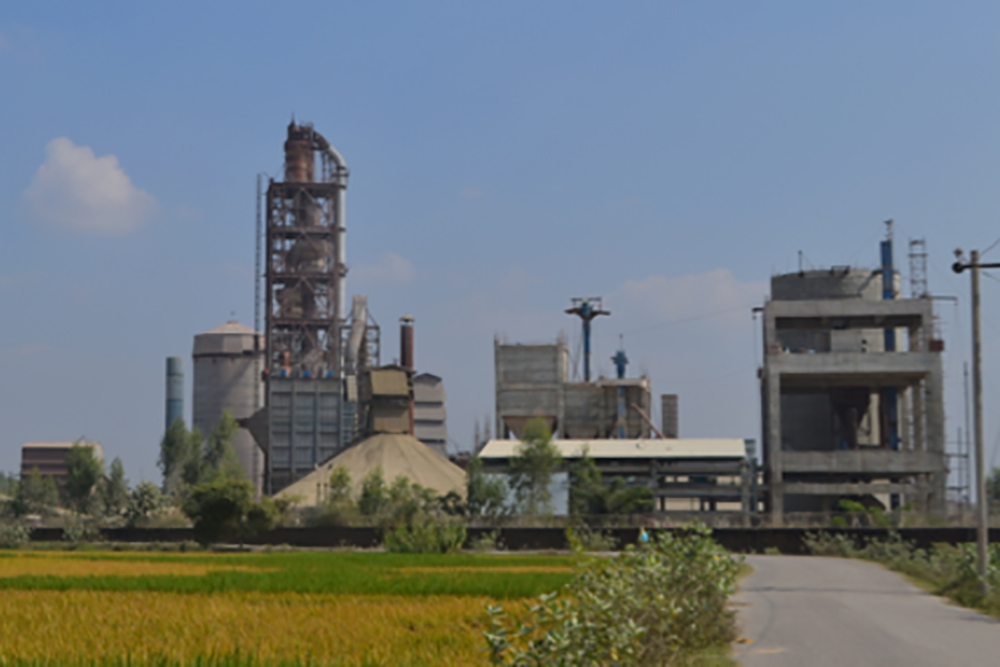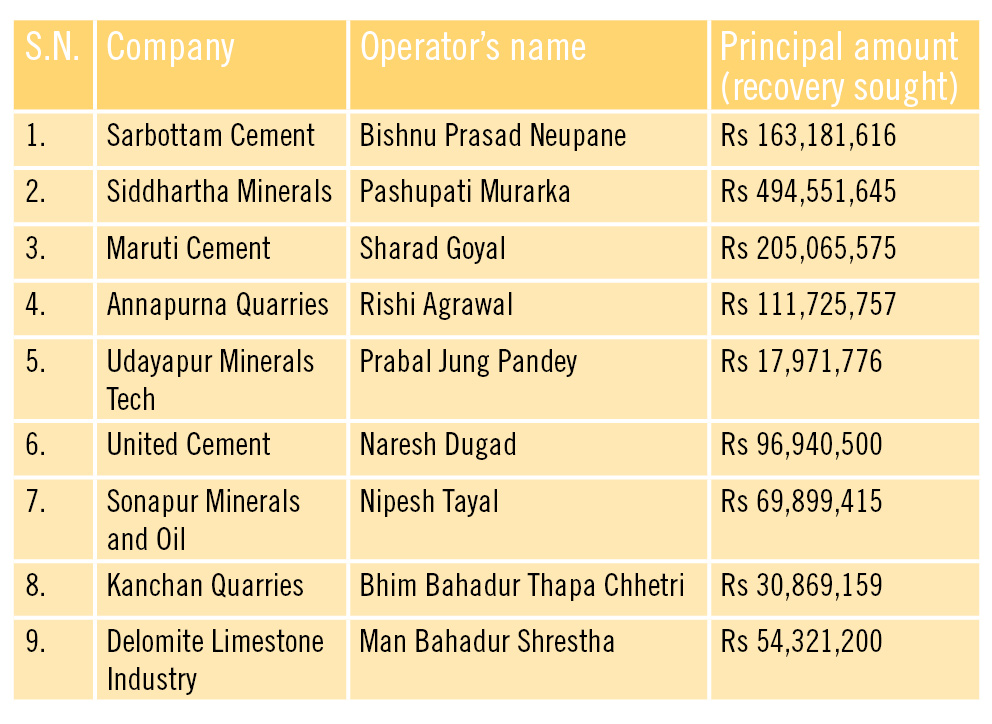
The private sector of the country is the major contributor to investments and jobs: nearly two-thirds of investment and 90% of employment is generated by the private sector. Policymakers always reiterate at different forums that the private sector is the engine of growth; however, the engine has been badly hammered time and again by state mechanisms — government and constitutional bodies. Recently, the Commission for the Investigation of Abuse of Authority (CIAA) — anti-graft body —filed a chargesheet at the Special Court against nine private sector companies and some officials of the Department of Mines and Geology accusing them of rampant mining at different sites by infringing on the criteria manifested while issuing the licence for mining. The CIAA has set a principal amount of Rs 1.24 billion to be collected from the nine companies and a fine along with a jail sentence of two years. The anti-graft body has also sued nine civil servants involved in the decision of awarding the licence for mines including the Director General of the Department of Mines and Geology, Ram Prasad Ghimire on January 26.
However, the companies against whom the CIAA has sought legal action have said they have been operating the mines by abiding with all the terms and conditions mentioned in the licence and have been limiting mining activities within the approved annual quantity. CIAA’s move to file a corruption charge against the private sector is baseless when the private sector companies have been operating mines by duly acknowledging the terms and conditions including the royalty approved by the government. “This corruption charge against the private sector companies is a harassment basically and will have an adverse impact on domestic and foreign investment in the country,” the Cement Manufacturers Association Nepal has said, adding “The state should not overlook the fact that investment in the cement industry has carried us towards the path of self-reliance in cement production amidst the growing import dependency.” The domestic cement industry has created high value addition as the country has sufficient raw materials (lime stone mines), which are sufficient to serve the demand for the next 180 years. The government too has been facilitating investment in cement factories in line with the policy to become self-reliant in cement production in which mining is integral. Nepal previously used to import clinker to produce cement and the factories then were established only for the grinding purpose. The government has also been facilitating cement factories by incentivising investors through developing access roads and electricity supply to mines. The CIAA has claimed that the mine operators had extracted limestone in excess as compared to the approved quantum for fiscal 2017/18 and 2018/19 by developing a strong nexus with the responsible officials. The anti-graft body has also mentioned that the concerned state officials have produced fake reports regarding the status of mining. CIAA has sued mine operating companies seeking recovery as follows:  Pashupati Murarka, owner of Siddhartha Minerals and former President of the Federation of Nepalese Chambers of Commerce and Industry, has said that instead of filing such baseless accusations investors should have been honoured by the state. “Any country that values investment would be felicitating those investing in the priority sector. Filing such chargesheets against private sector companies that have been following set rules and regulations is actually humiliating,” he said. Surendra Pandey, former Finance Minister, said that the state mechanism has over the years become extortionary in nature. Government agencies, political parties and their sister wings, courts, and constitutional bodies are simply guided by the predominating mindset that the private sector/businesspersons are profiteers. He questioned, “What is wrong about making profits when someone does so by abiding with all the legal requirements or without compromising on quality and quantity of the product or services they produce and sell in the market?” Pandey further said making profits in an ethical manner is essential for the sustainability of any company. “If a company cannot earn profits or faces continued losses, there will be no alternative other than to shut down the enterprise,” he shared, adding, “We must have more profit-making companies not only for their sustainability but also for generating more employment, enhancing production, and finally for reinvestment.” He further cited the emergence of more billionaires in China, despite the country following the unitary/socialist or communist political system. “China respects and investors and as a result it has emerged as the second largest economy of the world and a rising global power.”
Pashupati Murarka, owner of Siddhartha Minerals and former President of the Federation of Nepalese Chambers of Commerce and Industry, has said that instead of filing such baseless accusations investors should have been honoured by the state. “Any country that values investment would be felicitating those investing in the priority sector. Filing such chargesheets against private sector companies that have been following set rules and regulations is actually humiliating,” he said. Surendra Pandey, former Finance Minister, said that the state mechanism has over the years become extortionary in nature. Government agencies, political parties and their sister wings, courts, and constitutional bodies are simply guided by the predominating mindset that the private sector/businesspersons are profiteers. He questioned, “What is wrong about making profits when someone does so by abiding with all the legal requirements or without compromising on quality and quantity of the product or services they produce and sell in the market?” Pandey further said making profits in an ethical manner is essential for the sustainability of any company. “If a company cannot earn profits or faces continued losses, there will be no alternative other than to shut down the enterprise,” he shared, adding, “We must have more profit-making companies not only for their sustainability but also for generating more employment, enhancing production, and finally for reinvestment.” He further cited the emergence of more billionaires in China, despite the country following the unitary/socialist or communist political system. “China respects and investors and as a result it has emerged as the second largest economy of the world and a rising global power.”
Poster boy politics attacks private sector
“If you look at entrepreneurs closely then metamorphically we are like bees. There is a lot of running around to do to operate an enterprise, it is a multidisciplinary task,” shares Anada Raj Batas, Chairman of Batas Group. “Like how bees are important for pollination which is essential for the entire ecological system, entrepreneurs are essential for the survival of a nation.” Batas feels that he has been victimised by the government, especially by the poster boy politics or political stunts taken by ministers for public consumption. Batas Group has been forcibly kicked off from the properties they had leased through a unilateral decision of the government. Minister for Culture, Tourism and Civil Aviation, Prem Bahadur Ale, recently gave instructions to demolish the structures built by the Batas Group to run a cafeteria within the premises of Narayanhiti Palace Museum. Batas had legally won the bid to operate the cafeteria and for conservation of the park on the museum premises and for developing structures and garden/park and had duly signed an agreement for the purpose with the government-formed Narayanhiti Palace Museum Development Committee. However, when the government started facing criticism for awarding the contract to operate the cafeteria and building concrete structures, Minister Ale initiated action against Batas Group. He himself was present at the site when the structures built by Batas Group on the museum premises were being demolished. Following the instruction of Minister Ale, the Pashupati Area Development Trust (PADT) has also scrapped the lease agreement of Pashupati Dharamshala – a rest house for pilgrims – built with Indian assistance within the premises of the Pashupatinath Temple. Hotel Ananda, promoted by the Batas Group, had taken over the management of the facility about two years back by winning the bid called by the PADT. But Minister Ale has claimed that the lease agreement with Hotel Ananda was signed without approval of Dharmashala Operation Guidelines and that the hotel has developed the interiors and subleased some sections of the property to different offices and vehicle showroom in an illegal manner.
However, Batas states that it is not for a private sector company to confirm whether the guidelines and other legal documents are in proper place or not. “I was called to sign the contract by PADT and I checked the contract provisions based on which I could operate the management,” he shares. “Moreover, all the interiors were developed under the inspection of the government. I have been alleged for charging high rates for rooms but people have to understand that charges depend on the facilities being provided.” While Minister Ale has been credited for kicking off Batas from the Narayanhiti Palace Museum premises and is in the limelight now, misinformation about Batas is making the rounds on social media tarnishing his image. “This is poster boy politics,” says Semanta Dahal, a legal expert, “The government agencies or for that matter even a minister cannot exercise undue power and must act following the due processes of law.” When the lease agreement was signed with Hotel Ananda, Dr Milan Kumar Thapa was the Treasurer of PADT. And though the Batas Group has been condemned for the agreement, Minister Ale has appointed Dr Thapa in the senior-most role of PADT as its Member Secretary and convenor of the investigation panel formed by the Ministry of Culture, Tourism and Civil Aviation that has been tasked with submitting the investigation report regarding the lease contract with Batas Group. “The private sector has been victimised frequently even though we have no authority in state functions. It is government that enforces the law, inspects and regulates private sector companies,” said Shekhar Golchha, President of the Federation of Nepalese Chambers of Commerce and Industry. “I feel really let down and ashamed to see such activities against the private sector.”
Private sector condemns attack
Private sector umbrella bodies: FNCCI, Confederation of Nepalese Industries (CNI) and Nepal Chamber of Commerce (NCC) have condemned the series of attacks against the private sector. Issuing a joint press note, the private sector umbrella bodies have said the unreasonable attacks by state authorities will have an adverse impact on private sector growth which will consequently affect investment flow, employment, revenue and production. “It is a pity that the private sector has been facing series of extortions despite its contribution in inclusive economic growth and stability of the economy,” reads the statement. “Self-reliance in cement production has been achieved through facilitation of the government and investment of the private sector.” The private sector umbrella bodies have further said that the private sector is trying to get back on its feet from the adverse impacts of the Covid 19 pandemic but it will lose business confidence due to the series of attacks including the corruption charges on cement factories. Dr Sumitra Shrestha Amatya, Commissioner at CIAA, counters that private firms have been accused of hurting the government’s revenue by extracting more limestone than they were given permit for. "It is not that the anti-graft body investigates only the private sector parties, the commission also conducts investigations when necessary against non-governmental organisations and community user groups that concern or involve public sector corruption," she says. “What we have to realise is that mining or extracting ore to be precise is like donating blood, there are certain rules and standards which need to be followed,” she shares. “What will happen if you start donating blood every fortnight instead of every three months?”, she questions. Mahesh Acharya, leader of Nepali Congress and former Finance Minister who is credited for leading privatisation in Nepal, says the process of reforms to leverage the advantage of privatisation has halted and there a few private sector players who have started pleasing their political masters to bring down others. “I am not generalising the private sector here because a majority of them work genuinely. It is the duty of the government to keep things in order rather than meddling with the private sector,” he adds. READ ALSO: Business organisations stand in defence of corruption-accused cement industrialists






